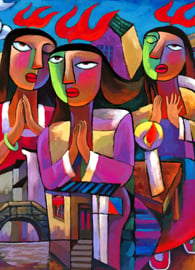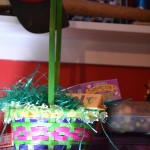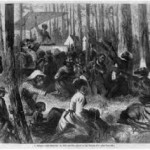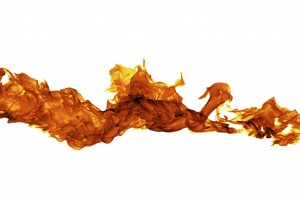
When I arrived at church on Pentecost Sunday a few years ago, I sat down in the pews and looked up to see red and orange balloons in the rafters, and a small red candle on the altar. The service bulletin explained that these were meant to symbolize the famous “tongues of fire” of the first Pentecost. After the service was over, I asked our pastor about this. “I don’t know what to do with Pentecost,” she mumbled.
Other churches aren’t much better. Mainline Christians (I’m a United Methodist) usually wear red to recall the fire of the first Pentecost (and because liturgical colors shift to red for the season of Pentecost). Nice touch, but these are hardly the “fiery tongues” of the first Pentecost. Another church I once visited processed down the aisle on Pentecost Sunday morning with a plastic dove high on the end of a fishing pole, with a silky train like a wedding dress, blowing in the soft breeze. That was very strange indeed.
To top it off, last year I read a church newsletter that had the heading, “Salsa and Chips” on the first page to shepherd members downstairs on Pentecost Sunday to … literally … eat salsa and chips in order to have their tongues “set on fire.” Then to vote for new committee members.
A violent, rushing wind. Fiery tongues. Foreign languages. The spectacle of apparent drunkenness. Peter’s successful debut (3,000 converts in a pop). These are the accoutrements of Pentecost that leave most of us out of this story. We don’t have wind, or fire; not even usually a fabulously inspired — or inspiring — sermon on Pentecost. What can one say to make sense of this unusual but seemingly important day in the life of Christianity … and Christians?
I have an idea. Let’s not fixate on the accoutrements of Pentecost but on what led up to that experience. Let’s shift our focus a bit and see how to prepare for Pentecost before being dazzled and distracted by spectacular signs and wonders. Here’s how.
Rule #1: Stay Put and Wait
Jesus gave clear instructions, “While staying with them, he ordered them not to leave Jerusalem, but to wait there for the promise of the father” (Acts 1:4-5). Then away he went. So Jesus’ closest followers and family settled down and waited: “Then they returned to Jerusalem from the mount called Olivet, which is near Jerusalem, a sabbath day’s journey away. When they had entered the city, they went to the room upstairs where they were staying” (1:12-13). They were so serious about taking Jesus at his word, they didn’t even stay at the Mount of Olives, but walked the mile and a half or so across the Kedron Valley to the old city of Jerusalem. It would have been easier — and more spiritual — for them to bend the rules a bit and sleep in the shadow of Jesus’ ascension. They didn’t. They went back to Jerusalem and waited, away from the fray of a miracle-fed faith.
Rule #2: Shut Up and Pray
They waited, but not idly. Jesus’ disciples “were constantly devoting themselves to prayer, together with certain women, including Mary the mother of Jesus, as well as his brothers” (Acts 1:12-14). Jesus’ earliest followers stayed put. They prayed. They prayed a lot.
There is nothing fancy, nothing fabulous here. But there is something important: Jesus’ dearest friends didn’t fill Jerusalem with frenetic activities, even good ones. If they’d been out and about, they wouldn’t have prayed the way they did. Life would have been too busy, too hectic, too frantic.
They chose to start by hunkering down for a long night’s prayer. Jesus didn’t tell them to pray; he only told them to wait. But they had seen enough of Jesus to know that waiting meant praying and praying meant waiting.
Praying, especially in groups, isn’t what Christians usually do best. We’re better at processing. If we have any hope of experiencing Pentecost, we’ve got to get over our embarrassment and practice prayer.
Rule #3: Sit Tight and Study
After Jesus’ followers had waited and prayed, Pentecost broke loose. “Amazed and astonished,” spectators asked, “How is it that … in our own languages we hear them speaking about God’s praiseworthy acts” (Acts 2:8-11).
God’s praiseworthy acts is shorthand for God’s participation in Israel’s history. In the Torah, Moses encouraged the Israelites to “acknowledge God’s praiseworthy acts, God’s mighty hand and God’s outstretched arm” (Deuteronomy 11:2). One of Israel’s poets urges:
“Sing to God, sing praises to God; tell of all God’s praiseworthy acts” (Psalm 105:1-2).
Strip off the spectacular, and you’ll see something going on in that Upper Room ahead of Pentecost. With all the talk of tongues and fire and drunks at 9 a.m., we tend to miss this part: Jesus’ people studied the Jewish Bible, the Christian Old Testament.
When Pentecost breaks loose, the content is clear and crisp even if the dialects are puzzling. Jesus’ followers recite God’s praiseworthy acts — the warp and woof of Israel’s Scripture. For all the emphasis in the story of Pentecost on the rush of a violent wind, for all the focus on speaking in other tongues, for all the talk of drunken disciples, for all of this, what remains when the dust settles is a group of undistinguished followers of Jesus who know and recite God’s praiseworthy acts.
This Is No Ordinary Day
Three years ago, a bright and capable college student asked whether my wife Priscilla and I would consider advising a theme house, in which students devote themselves to something — French or meditation or social justice. When I pressed her for details, she said, “I want to leave that to the Holy Spirit.” “What?” I puzzled. “Does she think inspiration flows when the brain shuts off?” Her comment wouldn’t have troubled me if she’d been a different sort of student, a lazy one perhaps. She wasn’t. She honestly believed that inspiration and preparation are mutually exclusive.
That’s just not right, at least not from the perspective of Christianity’s sacred texts. Pentecost didn’t catch Jesus’ followers by surprise. They waited. They prayed. They studied.
So what are we left with this ordinary Pentecost Sunday? Wait together, pray together, study together and, if the story holds true, even mainline Christians will have our Pentecost. This simple trio of practices can ignite us and our churches. And that, in the end, is the durable miracle of Pentecost.
This post first appeared last year (on Pentecost) at the Huffington Post: http://www.huffingtonpost.com/jack-levison/pentecost-for-the-rest-of-us_b_1540129.html.












